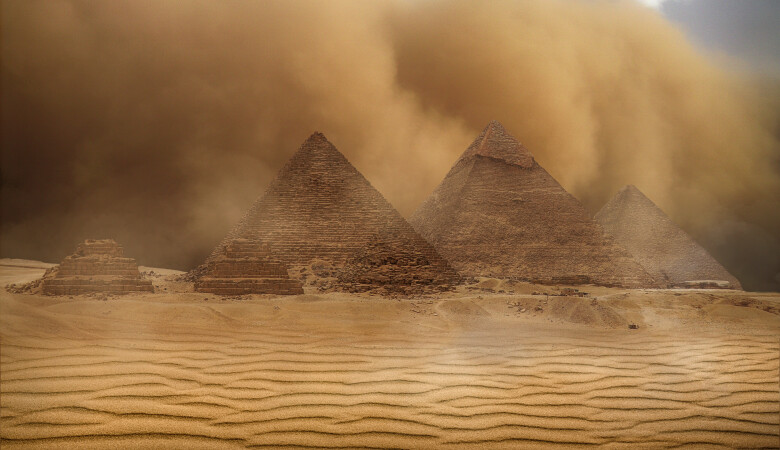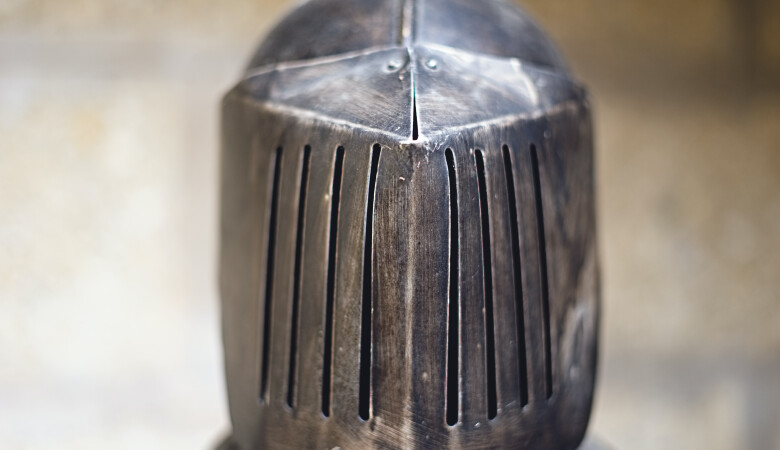God Delights in the Ethiopians (Isaiah Sermon 19 of 80)
September 21, 2008 | Andy Davis
Isaiah 18:1-7
Racism, Prophecy, Providence and Sovereignty of God
Pastor Andy Davis preaches a verse-by-verse expository sermon on Isaiah 18:1-7. The main subject of the sermon is God's delight in people all across the world including the Ethiopians.
- SERMON TRANSCRIPT -
I. Introduction
We are looking this morning at Isaiah Chapter 18. One commentator called it one of the most obscure chapters in Isaiah. But I think the more you study and the more you understand the circumstances, not only is it not obscure, but it actually is very applicable to our present day. We are in the middle of a series of oracles that the prophet Isaiah has given to the surrounding Gentile nations. The nations of the world make up an astonishing, brilliant, beautiful mosaic to the glory of God. God has created different races, tribes, languages, and peoples all over the world. Together they make up the human race. They bring great glory to God. Some peoples are characterized by their physical strength, some by their military prowess, some by their intellectual achievements, philosophy or science, some by their exquisite artistry, and some by their skill in trade or travel. All of these proclivities, these tendencies, bring glory to God. The differences between the tribes and the peoples and the nations were built into the original genetic code of one man, Adam. The apostle Paul told us in Acts 17:26, “From one man he made every nation of men, that they should inhabit the whole earth.”
Actually, God did that twice because you know that He destroyed the entire world in a flood. And so again, through one man, Noah, the entire human race was developed. Now, the differences between the races have come about by the magnificent variety that God built into the genetic code of that one man, Adam, or that one man, Noah. Differences between the races therefore come from God and bring Him glory. Pride between the races comes from sin, and dishonors God. Race is from God, racism is from sin. Racism may be defined as the belief that one race is inherently superior to another, and that race is the primary determining factor of human traits. Closely linked to racism, of course, are all sorts of bad behaviors, prejudices, oppressions, violence, and discrimination that one group foists on another because of racial differences. The 20th century, I think, saw the purest form of this evil of racism in the Nazi movement and their Aryan convictions that they were the purest and best race on the face of the earth, and that everyone else was inferior to them, if not actually subhuman.
They believed themselves to be genetically superior and everyone else to be genetically inferior. They took that ideology on the road through military conquest until they were finally defeated by the providence of God. But that doesn’t end the issue of racism itself. This country struggles with it. The end of slavery in the United States did not end the suffering of the African people who were stolen from their homelands. They’ve had to face racism ever since. Christian faith is diametrically opposed to racism, because racism is inherently based on pride. If we haven’t learned anything from the book of Isaiah, we can learn this: God hates pride. He hates it. Pride is the root of all sin, that me-ism. One thing I’ve noticed about racism is that people tend to celebrate the race they’re from. Have you ever noticed that? I’ve never found anyone that was racist on behalf of another race. It was always their own race that they felt was superior. Therefore, I think racism is really a form of self worship. It’s really a form of idolatry, and it is evil.
Now, we Christians, we know that. We know that the ground is level at the foot of the cross. Amen? Every single one of us depends on the shed blood of Christ to have any standing at all before our creator. It is because Jesus shed His blood that we can have access to the throne of grace. Amen? In that way, all of us are together. We all need a redeemer. And praise God, that Redeemer is available! Jesus Christ is the redeemer of the whole world, of people from every tribe, and language, and people, and nation. It says in Revelation 5:9-10, “They sang a new song” up in heaven, speaking of Jesus, “You are worthy to take the scroll and to open its seals, because you were slain, and with your blood you purchased men for God from every tribe and language and people and nation. You have made them to be a kingdom and priests to serve our God, and they will reign on earth.” Notice it’s a kingdom, not a multiplicity or a mosaic of kingdoms. We will be one in Jesus. Amen? We will serve the Lord forever. That’s where we’re heading, and that’s a beautiful thing. Now, Isaiah 18 is an oracle about one tribe, one nation, the Cushites. The political events with Assyria have led that distant nation from Africa to send envoys to Jerusalem to seek an alliance with, I believe, King Hezekiah and the Jews. The Cushite envoys come with a purpose, but God speaks through the prophet Isaiah concerning God’s larger purposes. God’s doing something much bigger than defeating the Assyrians.
He has a bigger purpose for the Cushites, and He has a bigger purpose for the whole world. That’s what this seven verse oracle is speaking about. In this brief oracle, God reveals His delight in the Cushites. He has pleasure in them. He enjoys their uniqueness and their distinctiveness. He speaks a word as a pleased, or as a delighted Creator about them, not just concerning their little political mission, their military mission, but about, I believe, their future, bringing gifts to almighty God in Jerusalem. I think that speaks of a spiritual purpose, of God’s desire to bring them to faith in Christ through the spread of the Gospel. Ultimately, the cure for racism is to spread the Gospel of Jesus Christ. We’re not going to have any of that in the new heaven and new earth. I’m looking forward to that, to being free forever from racism and frankly from every vestige of pride, to being so completely humble and immersed in a sea of worship that Jesus deserves for what He’s done at the cross.
In this brief oracle, we see the delight, the pleasure of God in Cush and His plans for them. It begins with these envoys coming from Ethiopia. Now, I know that Isaiah 18 is not primarily about racism, and this sermon’s not going to be about it. I’m going to give careful exegesis to it and I’m going to describe the political situation. But I tell you this, I think we ought to take every opportunity we can to find out the evils that surround us that may still be in our own hearts, and to preach clearly the truth so that God can be glorified. Sin always brings misery. It brings misery to those who have that locked within their hearts and also to those who receive the bitter fruits of it. So, we’re going to focus on Isaiah 18 and understand the glory of God in the spread of the Gospel to the ends of the earth.
II. Envoys from Ethiopia
Context: A Rising Power in Africa
The envoys are coming from Cush, Ethiopia. In modern history, we think of Ethiopia as a land of starvation and weakness. But in Isaiah’s day, the Cushites were a nation to be reckoned with. They were a rising power in Africa. After the flood, as I mentioned, Noah had three sons: Shem, Ham, and Japheth. Through them God would repopulate the entire earth. Cush was the eldest son of Ham in the table of nations in Genesis 10:7. His brother Mizraim was the Hebrew name for Egypt, probably the ancestor of the Egyptians. Cush seems to have settled farther south along the Nile River. From him came Seba, Havila, Sabta, Raamah, and Sabteca. All of them seem to have settled in Arabia. But some of his descendants seem to have crossed the Red Sea and settled in what we now know as Ethiopia. One of Cush’s descendants was Nimrod, who was a mighty warrior and who founded what became Babylon and Nineveh, two centers of godless empire-building. The Babylonian Empire and the Assyrian Empire eventually came from these cities that Nimrod, Cush’s descendant, planted.
According to Ezekiel 29:10, the southern border of Egypt was its common boundary with Cush. This was the land of the Nile River, stretching almost 2,500 miles by air. But because of its twisting and meandering course, the Nile River is over 4,000 miles long, the longest river on the face of the earth. The Nile Valley was formed as water cut its way through the sandstone and limestone. It made cataracts, or waterfalls, which interfere with navigation and section off portions of the river. In those various valleys and basins, peoples formed. The Cushites were among them. Cushites settled the region of the fourth cataract, or waterfall, and there they flourished.
Some commentators believe that the Queen of Sheba, or the Queen of the South in the NIV, was actually a Cushite who came from this very region. She heard of Solomon’s fame and came to see all that Solomon had done. There formed a link, then, between the Cushites and what God was doing in Jerusalem, the glory He was spreading through the Davidic kingships of David and Solomon. She was overwhelmed. As the Old Testament era ended, there is a tradition, perhaps a myth, that it was the Cushites that rescued the Ark of the Covenant. No matter what Indiana Jones thinks, there are some Ethiopians that say they’ve got it. It’s in an Orthodox temple. You can’t see it, but they take care of it. I don’t know what good it would do to see it. God is not in the business of leaving us physical artifacts for us to focus our worship on. He actually tends to destroy those things, like the bronze serpent that was destroyed because it had become an idol. At any rate, there is that tradition. You can follow it on the internet or however would be interesting to you. They say they rescued the lost Ark of the Covenant and that they still have it.
Around the time of Isaiah, somewhere around 720 to 715 BC, the Cushites got so strong that they were able to basically conquer Egypt and take it over. They set up the 25th dynasty and they ruled until around 633 BC. So they were in charge of Egypt at this time. And now, these Ethiopian rulers were sending emissaries to Judah to organize an anti-Assyrian coalition.
Palestine: the Playground and Battlefield of Egypt and Assyria
Let’s set the stage in terms of the geopolitics of the region. Palestine, the ancient near east, that area of Judah and Israel and all those tiny little kingdoms, was between two mighty empires at the time: the Assyrian Empire to the north, and the Egyptian Empire to the south.
The Assyrian Empire to the north was between two rivers. The Mesopotamian region literally means “between two rivers.” It was a fertile area, and because of the fertility of the soil, they were strong and powerful militarily and culturally. They sought to take that dominance on the road and build, as they did, the Assyrian Empire. In the south it was Egypt. Again, because of the fertility of the soil through the Nile River, they were strong and powerful and able to project their power as well. Between these two empires was this little region called Palestine. It was their playground, the battlefields, the chessboard between these two empires. There was always stuff going on, always intrigues, emissaries and alliances being formed. This was an opportunity for such an alliance.
Isaiah 18: A Message to Ethiopia by Means of Their Emissaries
During this time, the Cushites, having gained control of Egypt, wanted to link up with this Judean king. I believe it was King Hezekiah. So they sent emissaries to try to make an arrangement and an alliance against Assyria. They show up in Jerusalem, but there’s a prophet there named Isaiah, and he’s got something to say about this mission and these emissaries. He’s got a prophetic word to speak about the future. And he speaks it. Look at verses 1-2, “Woe to the land of the whirring wings along the rivers of Cush, which sends envoys by sea in papyrus boats over the water. Go, swift messengers, to a people tall and smooth-skinned, to a people feared far and wide, an aggressive nation of strange speech, whose land is divided by rivers.” This is the land of whirring wings.
You can almost hear them, the tsetse flies or perhaps other types of flies. There are lots of flies in Egypt along the marshes where the reeds grow. These folks come from the rivers of Cush, a land, it says, divided by rivers. So Isaiah’s oracle reaches to a land over 1,500 miles away, a land populated by people very different from the Jews, a land that God intended to conquer someday with the Gospel of Jesus Christ. They send envoys. As mentioned, Cush takes control of Egypt and sends envoys to curry favor with King Hezekiah. They come in these little papyrus boats. They’re lightweight boats. If you’re going to travel through the cataracts, through the waterfalls, it’s good to have a boat that you can carry. So these are lightweight boats made of reeds, or grass, and that’s how they come. They’re designed to travel lightly and quickly. They had traveled an enormous distance to make their case to King Hezekiah, to check the power of the Assyrians, perhaps even to defeat the Assyrian Empire.
The Envoys Sent Back Home with a Message
But Isaiah sends the envoys back home with a message. He sends them back. “Go, swift messengers, to a people tall and smooth-skinned, to a people feared far and wide, an aggressive nation of strange speech, whose land is divided by rivers.” The Lord, through Isaiah, describes the Cushites with a pleasure, the pleasure of the Creator. He delights in the Cushites. He enjoys them. He enjoys their uniqueness, their attributes. I have the sense almost of the way God, in the Book of Job, describes the different physical aspects of His creation; of the sun and the moon and the stars, the stability of the earth and different animals He’s created and their attributes.
First of all, they are swift. They’re good runners. In the time of the rebellion against King David by Absalom, there was a Cushite man that wanted to run and bring the news that Absalom was dead, and the rebellion had been destroyed. Do you remember that? They’re long-distance runners. They do very well in the Olympics. Have you noticed? It’s the Ethiopians that win the 5,000 and the 10,000 and the marathon if they can. They’re great runners and have been for a long time. They’re swift, and they’re tall, and they’re smooth-skinned, and they’re a people feared far and wide. These envoys represented an unusually tall people. As a matter of fact, some research that I did listed some tribes in Ethiopia and the Sudan as the tallest people on the face of the earth, statistically. In the case of one of these tribes from that area, males can have an average height of six feet four inches tall, women six feet tall. They’re a tall people, and they’re powerful militarily.
Herodotus, the first Greek historian, called the Father of History, visited Egypt around 460 to 450 BC. He wrote this about the Ethiopians, he said, “The Ethiopians to whom this embassy was sent are said to be the tallest and handsomest men in the whole world. In their customs they differ greatly from the rest of mankind, and particularly in the way they choose their kings; for they find out the man who is the tallest of all the citizens, and of strength equal to his height, and they appoint him to be ruler over them.” That’s a unique way to choose a leader. It’s the very same thing they noted about Saul, though, that he was a head taller than any of the other people. So it’s not unheard of that the tallest man, the most powerful man, is going to be the king.
It says of them that they are smooth-skinned. Now, the Egyptian priests shaved themselves head to toe once every three days. But these people didn’t need to do that. They were smooth-skinned already and had no need to shave themselves. They were, as we said, a people feared far and wide. They were aggressive militarily and strong. They had already taken control of Egypt, and that was no small accomplishment.
Ancient historians tell the story of some Persian messengers who went to the Cushite king to discuss a possible alliance with him. This was in the era of the Persian Empire. The Cushite king brought out a standard bow that their archers used, but the bow was unstrung. He challenged the Persian messengers to string the bow, and none of them could do it. And he said, basically, “When you’re able to send men who can string one of our bows, then we’ll talk about an alliance.” They’re powerful and strong, and, you can see, also a little prideful.
A modern website speaks of the Ethiopians as the only Black nation in history never to have succumbed to slavery or colonial rule. The Italians, British, Dutch, Portuguese, Turks, Spanish, Arabs, and French tried twenty-seven times to conquer Ethiopia but failed every single time. Yet they easily defeated all other African tribes and empires to carve out a niche for themselves in the Horn of Africa. This speaks of military prowess and the power of this small nation. Because of this, and because of God’s plans for Assyria, God is issuing them a warning. “Military aggression ends in destruction. If you take what you have and you start spreading out, you start conquering other people, you’re going to come under my judgment.” That’s what the woe is at the beginning of the chapter. He’s giving them a warning. He’s going to warn them more than anything though what He’s going to do to the Assyrians. So if you have plans to conquer the world, put them aside, because God has His own plans to conquer the world. You’re just going to be running head to head with Him.
III. The Message to the Peoples of the World
Something Magnificent is About to Happen
So that’s the warning that He gives to these amazing people. And what is this message? Look at verses 3-6, the message to the peoples of the world. “All you people of the world, you who live on the earth, when a banner is raised on the mountains, you will see it, and when a trumpet sounds, you will hear it. This is what the Lord says to me: ‘I will remain quiet and will look on from my dwelling place, like shimmering heat in the sunshine, like a cloud of dew in the heat of harvest.’ For, before the harvest, when the blossom is gone and the flower becomes a ripening grape, he will cut off the shoots with pruning knives, and cut down and take away the spreading branches. They will all be left to the mountain birds of prey and to the wild animals; the birds will feed on them all summer, and the wild animals all winter.” Something magnificent, something noteworthy is about to happen, says Isaiah. The message is given to all the nations of the earth. Why? Because they all have the same ambition. They’d like to conquer the world if they could. Now, some nations find themselves in a position to try, but he’s addressing all the peoples of the earth concerning this ambition. God is going to do something dramatic. It’s as if He’s saying, “Drum roll, please. Now, pay attention to what I’m doing.”
The Seemingly Silent God Speaks
The nations of the world are going to sit up and take notice of what God is about to do. When a banner is raised on a bare hilltop, people from miles around can see it. When a trumpet sounds clearly and loudly, people from miles around, they can hear it. The Lord is going to communicate something to every tribe and language and people and nations about His great power. At this point, the seemingly silent God speaks at last. It seems like God isn’t even there sometimes. Is He even there in the natural disasters and with the rise and fall of the empires? People have asked that again and again when suffering and tragedy come. Is there even a God? It seems like He’s not even there. People cry out to Him and there’s no answer. It just seems like He doesn’t exist to some. But He is there. Oh, He’s there! Right from the very beginning of the book, we have these words, that God is there, and He is not silent.
Isaiah 1:2 says, “Hear, O heavens! Listen, O earth! For the Lord has spoken.” Here in this oracle, verse 4 says, “This is what the Lord says to me: ‘I will remain quiet and will look on from my dwelling place, like shimmering heat in the sunshine, like a cloud of dew in the heat of harvest.” Oh, He’s there! He is powerful, and He’s watching, it seems, very quietly. He’s like the rising heat. You wonder if He’s there, but you can perhaps occasionally see the shimmering. You think, “All right, maybe He really is there.” Now, there’s a legal maxim that says, “Silence means consent.” Well, that doesn’t work when it comes to God, let me tell you right now. Just because God is silent doesn’t mean He agrees. Not at all.
It says in Psalms 50:21, “These things you have done and I kept silent; you thought I was altogether like you.” Oh, but He’s not altogether like us. And just because He’s silent doesn’t mean He agrees. Not at all. God’s silence actually is time to lead us to repentance. His patience means repentance and salvation. That’s what He’s waiting for. 2 Peter 3:15 says, “Bear in mind that our Lord’s patience means salvation.” Romans 2:4, “Do you show contempt for the riches of His kindness, tolerance, and patience, not realizing that God’s kindness leads you towards repentance?” Here, God is silent like shimmering heat and like a cloud of dew, silent, but ready to act.
How unlike the tumultuous kings of the earth that we talked about last week in Isaiah 17:12, “Oh, the raging of many nations – they are like the raging sea! Oh, the uproar of the peoples – they roar like the roaring of great waters!” That’s what we’re like. We’re noisy, but it’s signifying nothing. God is silent and signifying everything, sitting on His throne. He sits serenely up there on His throne. He sits enthroned above the circle of the Earth. The people before Him, they are like grasshoppers.
God’s Magnificent Plan: Judgment on the Aggressor
God has a magnificent plan, and that is judgment on the aggressor. Look at verses 5-6. “For, before the harvest, when the blossom is gone and the flower becomes a ripening grape, he will cut off the shoots with pruning knives, and cut down and take away the spreading branches. They will all be left to the mountain birds of prey and to the wild animals; the birds will feed on them all summer, the wild animals all winter.” This is a bit of an agricultural analogy, perhaps like a parable. There’s a spreading vine, and it’s moving out. It’s advancing itself. Its branches are moving. We might know it as kudzu. Okay, have you ever seen that? It just grows and grows. It seems like it can’t be stopped. But here, there’s even some fruit. It’s a flowering and then a fruitful vine that seeks to move out. Notice that He doesn’t mention Assyria here directly, because it’s a message for all the nations.
Right now, it’s Assyria, at the time of the oracle. But it could be the Cushites too. Maybe they have ambitions for the world. It’s anybody who wants to move out with military prowess and take over the face of the earth. God will stand and He will say, “No.” He will cut off with a pruning knife those spreading branches. And what’s going to happen to all of the fruit? The birds are going to come and eat it. It’s a picture of desolation and judgment. It’s God fighting against you. Now, the Cushite envoys have come and they’re trying to play the geopolitical game. They’re trying to make an alliance. They’re going to stop Assyria. Assyria will be thwarted. They’re so clever, they’re so wise, and they come to talk to King Hezekiah about making this kind of an alliance. God says, “I have my own plans for Assyria. I’ve already made them plain through my prophet Isaiah.”
We have already read it. Isaiah 10:12 says, “When the Lord has finished all his work against Mount Zion and Jerusalem, he will say, ‘I will punish the King of Assyria for the willful pride of his heart and the haughty look in his eyes.’” This is Isaiah 10:16-17, “Therefore the Lord, the Lord Almighty, will send a wasting disease upon his sturdy warriors; under his pomp a fire will be kindled like a blazing flame. The Light of Israel will become a fire, their Holy One a flame; in a single day it will burn and consume his thorns and his briers.’” One day. Just one day. He’ll take care of Assyria. Now we know what that is. That’s when Sennacherib threatened Jerusalem, came right up against it. God sent out the Angel of the Lord, and in one night, one hundred and eighty-five thousand Assyrian troops were dead. “Cushite envoys, I don’t need you.”
There doesn’t need to be any alliance between Judah and Egypt. It’s not necessary. As a matter of fact, it’s sin. We’ll talk about that next week. “Judah doesn’t need you, but you need Judah. A little more specifically, you need a savior coming from Judah.” That’s the message here. God knows His sovereign plan. He knows His own perfect timing. Though He is quiet, though He is silent like shimmering heat in the sunshine and like a cloud of dew, He will act when the time comes, quite boldly. It says in Isaiah 14:25-27, “’I will crush the Assyrian in my land; on my mountains I will trample him down. His yoke will be taken from my people, and his burden removed from their shoulders.’ This is the plan determined for the whole world; this is the hand stretched out over all nations. For the Lord Almighty has purposed, and who can thwart him? His hand is stretched out, and who can turn it back?” God is enough, Amen? His power is enough. What matters is what God thinks. What matters is what God is doing, not all these plans, trying something on our own, on the side. It doesn’t matter. What matters is, what is God’s will? What is He doing? That’s what matters.
IV. Gifts Sent from the Ends of the Earth
The Envoys Return --- to Worship!
God gives a prophecy through Isaiah. The envoys are looking for some kind of a political arrangement. Actually, let me tell you what’s going to happen with Cush. There’s going to come a time when they’re going to send gifts from the ends of the earth. They’re going to send it to Zion and they’re going to worship the Lord, the Lord Almighty. Look at verse 7, “At that time gifts will be brought to the Lord Almighty from a people tall and smooth-skinned, from a people feared far and wide, an aggressive nation of strange speech, whose land is divided by the rivers – the gifts will be brought to Mount Zion, the place of the name of the Lord Almighty.”
The gifts will be sent by envoys. They’re going to come back and they’re going to worship. The Cushite envoys first came to recruit for military alliance. These powerful people are described for a second time. God just can’t seem to get enough of saying these words. He enjoys the Cushites. He likes talking about them. But at that time, those Cushites are going to send gifts and they’re going to worship the God of Abraham, Isaac, and Jacob. They’re going to worship at Mount Zion.
Old Testament Fulfillment: 2 Chronicles 32:23
Now, there is a physical fulfillment of this. In 2 Chronicles 32, 21-22, this is what it says: “The Lord sent an angel, who annihilated all the fighting men and the leaders in the camp of the Assyrian king. So he withdrew to his own land in disgrace.” That’s the defeat of Assyria. One angel, the Angel of the Lord, gets sent out and Assyria gets defeated. He withdraws to his own land in disgrace. “And when he went into the temple of his god, some of his sons cut him down with the sword. So the Lord saved Hezekiah and the people of Jerusalem from the hand of Sennacherib king of Assyria and from the hand of all others.” That’s the banner raised up on the bare hilltop. That’s the trumpet blast that all nations will hear. And they did hear. That was Assyria. That was Sennacherib. That was almost 200,000 troops killed in one night, while the nations sat up and took notice. He took care of them on every side. 2 Chronicles 32:23, “Many brought offerings to Jerusalem for the Lord and valuable gifts for Hezekiah king of Judah. From then on he was highly regarded by all nations.”
So they’re going to physically come, after Assyria gets crushed, and the Cushites are going to bring gifts. They’re going to link up. Perhaps it’s enlightened self-interest. “It’s good to be on the good side of the Jewish God, we’ve noted.” They want to worship, so they bring gifts. That’s what Isaiah’s predicting. But I think he’s predicting far more than that. By the way, just a note about Hezekiah: at that time, when he was receiving ambassadors and people coming from all over, and they’re bringing gifts, his heart gets puffed up with pride. Can you believe it? Oh, how pestilent is human pride! And Hezekiah’s like, “Ain’t I something?” What did Hezekiah do? When he heard of an overwhelming Assyrian force, he got down on his face and pleaded with God to save the remnant that still survived. He had the good sense to know that he had no chance if God didn’t intervene. That’s all.
Hezekiah receives these emissaries, and 2 Chronicles 32:25 says, “Hezekiah’s heart was proud and he did not respond to the kindness shown him; therefore the Lord’s wrath was on him and on Judah and Jerusalem.” Can I just urge you by way of application to search out pride in your life and destroy it? Wherever you find it, wherever you find it. Start looking in certain places, like when good friends give you some advice on how you can do better. For example, your spouse might have some input on how you could improve some area of your life. That’s a chance for you to find out if there’s any pride in your heart. Oh, there are many such opportunities. Look at your ambitions, look at your hopes and desires. What are you driving for? How many of them are traced back to your own pride? Search it out and destroy it, friends. I need to do the same.
God’s Ultimate End: Worship by All Nations
But what is God’s ultimate end for the earth? Why does He put up the banner on the bare hilltop? Why the trumpet beckoning? Because He wants to be worshipped, friends. He wants you to forget yourself. He wants you to turn away from your own petty little interest, your own empire building. He wants you to get down on your face and worship Him, and delight in Him in spirit and in truth. That’s what He’s doing. So those little gifts that are brought by the Cushite emissaries after the Assyrians die, that’s just a symbol, friends. That’s yet another prophecy, that’s all it is. It’s a prophecy of the Gospel of Jesus Christ. When the Gospel goes out to the ends of the earth and the true gifts come from the nations, that’s the people themselves bringing their own hearts, their own bodies prostrate before God and saying, “Here I am.” Presenting to God a living sacrifice, holy and pleasing, themselves, that’s the gift.
They’re going to come from all over the earth. Regarding God’s original purpose in calling Abraham the father of the Jews, He said this in Genesis 12:3, “I bless those who bless you, and whoever curses you I will curse; and all peoples on earth will be blessed through you.” Now just wait till next week. Wait till next week, when in Isaiah 19 we talk about how God says this, “The Lord Almighty will bless them, saying, ‘Blessed be Egypt my people, Assyria my handiwork, and Israel my inheritance.’” Wow, that brings goosebumps, that God would actually call Egypt “His people.” Yes, He will in the new covenant, through the blood of Jesus Christ. So God has some specific purposes for the Cushites. They’re going to come and they’re going to bring gifts. They’re going to come and worship the true God. Psalm 68:29-32 says, “Because of your temple at Jerusalem kings will bring you gifts… Envoys will come from Egypt; Cush will submit herself to God. Sing to God, O kingdoms of the earth, sing praise to the Lord.”
Zephaniah 3:9-10 says, “Then I will purify the lips of the peoples, that all of them may call on the name of the Lord and may serve Him shoulder to shoulder.” Listen, “From beyond the rivers of Cush my worshippers, my scattered people, will bring me offerings.” Isn’t that sweet? Zephaniah 3:9-10, where God is predicting that some from the Cushites will come and worship Him forever. God’s ultimate aim, then, is worship from all nations. Isaiah 52:10 says “The Lord will lay bare his holy arm in the sight of all nations, and all the ends of the earth will see the salvation of our God.” Isaiah 60:11-13 says, “Your gates will always stand open, they will never be shut, day or night, so that men may bring you the wealth of the nations – their kings led in triumphal procession. For the nation or kingdom that will not serve you will perish; it will be utterly ruined. ‘The glory of Lebanon will come to you, the pine, the fir, and the cypress together, to adorn the place of my sanctuary; and I will glorify the place of my feet.’” And it says in Isaiah 56, “My house will be called a house of prayer for all nations.” That’s God’s purpose in Isaiah. That’s God’s purpose to the ends of the earth.
V. New Testament Fulfillment: the Ethiopian Eunuch
The Ethiopian Eunuch Came for the Old Covenant, Discovered the New Covenant
There is a brief New Testament fulfillment to all this. Ain’t it sweet? In Acts 8, an Ethiopian eunuch has gone up to worship. He’s gone to the temple to worship. Why has he gone there? He’s heard of the fame of the Jewish God, and he wants to worship. He is an important official in charge of the treasury of Candace, Queen of the Ethiopians. He’s an important man. He’s gone there for the Old Covenant worship. He’s taken part in the animal sacrifice system. He’s on his way back, riding in his chariot, and he’s reading the book of Isaiah the prophet.
Oh, Isaiah has converting power, my friends! So there he is, reading Isaiah the prophet, and this is what it says in Isaiah 53:5-6, “He was pierced for our transgressions, he was crushed for our iniquities; the punishment that brought us peace was upon him, and by his wounds we are healed. We all, like sheep, have gone astray, each of us has turned to his own way; and the Lord has laid on him the iniquity of us all.” That’s what he was reading. You can’t choose a better portion of Isaiah to be reading, especially if you’re unconverted. So, he was reading Isaiah, and he was reading about Jesus Christ, the substitute, the Son of God who came to shed His blood. But it didn’t make any sense to him. Who is this man who died? Who is this suffering servant?
Well, the Holy Spirit leads an emissary, an envoy, a messenger, a missionary named Phillip, one of the original seven. God laid on him, by an angel and by the indwelling spirit, “Go down to that desert road. I’ve got work for you to do.” And he sees the chariot, he runs up alongside it and jumps in. I think actually the Ethiopian invited him in first, all right? You need to be invited in. You need to build that connection relationally. He said, “What are you doing?” “I’m reading.” “Do you understand what you’re reading?” “How can I,” he says, “unless someone explains it to me? Please evangelize me.” Friends, don’t miss one like that.
You actually ought to pray for them. If you’re not really being that fruitful in evangelism, pray for an easy one. You know what I mean? A big, slow pitch right down the center of the plate that you can knock over the fence. Ask for something. Say, “God, give me an evangelistic opportunity equal to my immaturity and lack of courage and boldness.” He’ll answer that prayer. But he’s saying, “I need someone to explain Isaiah 53 to me. Can you do it?” Oh, you need to be ready for that moment. “I can do it. God sent His son. His name is Jesus. He entered the world. He lived a sinless life. He did great miracles to prove his deity. He taught great things to prove His wisdom. But the greatest thing He did of all was He took our sins on Himself. He was our substitute. He died in our place. All we like sheep have gone astray. Each of us has turned to his own way, but the Lord laid on him the iniquity of us all. He’s talking about Jesus.” The Ethiopian man was drawn in. “What do I do? What do I have to do to be saved?” “Repent and believe.” Friend, you may have come here today by the provident hand of God and you’re not saved. You don’t know the forgiveness that this Ethiopian eunuch found. Find it in Christ.
It’s the same message. Then gifts will be brought by you. Not just by the Cushites, but by you, to Almighty God. Simply repent and believe in Him. Trust in Him. The Ethiopian man, he did it. He said, “Look, here’s some water, why couldn’t I be baptized?” No reason. So they stopped the chariot, and right there and then Philip baptized. When he came up out of the water, immediately the Lord took Philip away, disappeared, poof! Now that’s an exciting moment in redemptive history. “Whoa, where did he go? He’s gone!”
The Beginning of the Church in Ethiopia
The Lord dropped Philip at Azatus and he continued his preaching ministry there. But the Ethiopian eunuch went on his way rejoicing. He went down to Ethiopia where Irenaeus tells us that he continued in evangelistic ministry himself. We don’t anything more about this man. He drops from the pages of history. I can’t imagine, however, that he didn’t go back and lead many to Christ. See, God has plans for Ethiopia. In the fourth and fifth centuries AD, after the Gospel had already started to spread around the world, a shipwreck brought two men to the Cushite kingdom. Those two eventually led that king to faith in Christ. Athanasius sent one of them back as the first bishop, orthodox bishop. He set up the church there in Ethiopia, so the Gospel was planted in Ethiopia. But friends, that’s in the past. That’s in the past.
The Future of Ethiopian Worship … the New Jerusalem
What’s in the future? I’ll tell you what’s in the future, the new Jerusalem, the new heaven, and the new earth. Its gates are going to stand open night and day. It says in Revelation 21, “The nations will walk by its light, and the kings of the earth will bring their splendor into it. On no day will its gates ever be shut, for there will be no night there. The glory and the honor of the nations will be brought into it.” Those are the gifts that are going to be brought from a people tall and smooth-skinned, a people feared far and wide, whose land is divided by the rivers, an aggressive nation of strange speech. They’re going to bring gifts eternally into the new Jerusalem. Amen?
VI. Application
Believe the Gospel Like the Ethiopian Eunuch Did
So what application can we take from this? Well, let’s start with this: believe in the gospel as the Ethiopian eunuch did. Believe in it the first time today for the forgiveness of your sins, and continue to believe in Christ. He is the focus of Isaiah. He’s the focus of all scripture.
Preach the Gospel Like Philip Did
Secondly, be ready to preach the gospel as Philip did. Are you prepared? Suppose you were reading something a little more obscure than Isaiah 53, would you be ready? Are you ready to share the gospel? Get yourself ready. Pray that prayer. You can laugh, but pray it. Say, “Lord, make me a witness today. Give me a chance. I’m weak.” He knows you’re weak. “Lord, I’ve been fruitless.” He knows that. “Oh God, give me a chance today to witness. Help me to be ready.” And pray for the advance of the gospel, not just in Cush, in Ethiopia, but to the ends of the earth. God has plans for people from all over the world. Pray for it, and get involved in it.
Delight in the Races as God Does
Delight in the races as God does. I have a theory. I was talking to Matthew Hodges about it this week. I have a theory that we will have our racial distinctions up in Heaven, in the new Jerusalem. I think we’ll retain them. I think God loves variety. I think He created them for His own glory. That’s why there’s people from every tribe and language and people and nation. It says in Revelation 7:9-10, “After this I looked and there before me was a great multitude that no one could count, from every nation, tribe, people, and language, standing before the throne and in front of the Lamb. They were wearing white robes and were holding palm branches in their hands. And they cried out in a loud voice: ‘Salvation belongs to our God, who sits on the throne, and to the Lamb.’” Oh, that’s the end of racism there, friends; it’s gone. We will delight in the variety of what God has done. People will be coming from many different roads, many different places to believe in Christ.
Despise Racism as God Does
Finally, despise racism as God does. Be open to what God is doing through this church in the urban ministry. Get involved in it. Ask Matthew how you can get involved in the urban ministry. We have a health fair coming up, get involved. Wouldn’t it be delightful to see, as much as possible, here in this local church, the variety that we’re going to see in heaven? Close with me in prayer.































